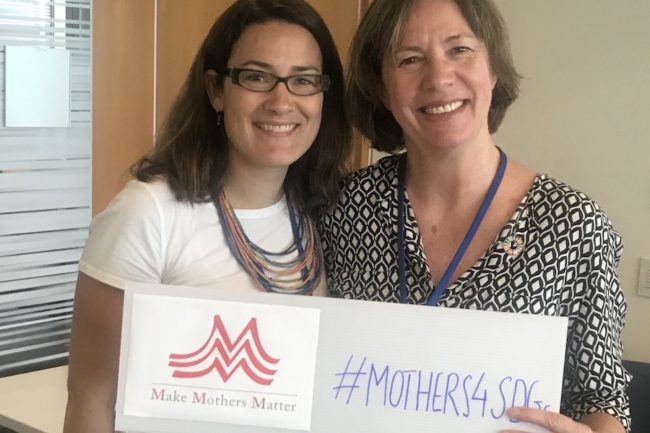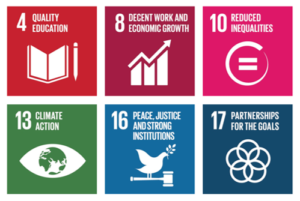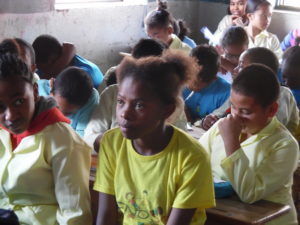Huge challenges remain for the realisation of most SDGs – How about empowering #Mothers4SDGs?
01.08.19
UN New York – MMM was at the High-Level Political Forum (HLPF), which took place on 9–18 July at the UN headquarters. The 2019 HLPF completed its first 4 years cycle with the review of SDGs 4, 8, 10, 13, 16 and 17. Here are our summary reports from the official sessions.

HLPF Opening – There has been progress on the realisation of SDGs, but a lot remains to be done

SDGs under review at the 2019 HLPF
All SDGs are interlinked (e.g. gender equality leads to progress on decent work for all, poverty reduction, etc.) and progress in one sector is passed on to others. It is therefore important to have a global and international approach to problems.
Some of the 17 SDGs have a transformative character, especially education (SDG4), health (SDG3), and sustainable consumption and production (SDG12). They are fundamental for the realization of the other goals… Incidentally, mothers have a key role to play in the realization of these 3 SDGs, and more generally to the whole 2030 development agenda.
Unfortunately, most SDGs show slow progress and are off track to reach their 2030 targets – Especially SDG4 (education), 10 (inequalities) and 13 (climate change), as detailed below.
“We need to transform our actions and truly accelerate the pace if we want to reach the SDGs by 2030,” said ECOSOC President.
Session on SDG4 – Education is in crisis: at the current pace, the objective of quality education for all will not be reached

School attendance in Madagascar – Credit: Otitsara, an MMM member association
The statistics are dire: 1 out of 5 children do not attend school, especially girls. Among those attending school, 1 out of 3 does not have the expected level of proficiency. And there are still 750 million people who are illiterate, two-thirds of them being women.
In some developing countries, girls face specific obstacles: they have difficulties going to school when they have their period because of the lack of sanitation, or they are pulled out of school for early marriage.
The potential of Early Childhood education is now clearly recognized, backed by studies showing that children do better at school if they have received pre-school education; but only 50% of children have access to pre-school.
Furthermore, teachers, the cornerstone of education, are still undervalued and underpaid. They must be better supported, and their number must increase if we want to achieve inclusive and quality education for all.
On the positive side: women’s literacy rates are rising and new technologies, online learning in particular, are making education possible in ways that were not possible before.
Education is one of the development goals but it is essential to achieve all the others: end poverty by providing better prospects, being in good health by making informed choices, fight against climate change knowing the consequences of our actions, and so forth. Education is a human right; it empowers people and ensures inclusiveness and equality – #EducationTransformsLives! – And for mothers and family, it makes the difference: children of educated mothers are healthier and more educated.
However, according to Stephanie Gianini, UNESCO Assistant Director-General for education, the challenges are such that we need a paradigm shift: we must change the way we learn, change the way we teach – from early childhood to life-long education. And we must include responsibility, sustainability and global citizenship in curricula.
Session on SDG10 – Inequalities between and within countries remains unacceptably high
Inequality encompasses different aspects, often adding up:
- Economic inequality: in many countries, the top 1% earners have seen their income increase, while the bottom 40% receive less than 25% of the overall income.
- Gender inequality: In 2018, women represented 39% of the workforce, but only 27% of managerial positions. Globally they do a disproportionate share – 3 times more than men – of unpaid care and domestic work; and this care gap, which remains the main structural barrier to their economic participation, widens when women have young children at home. There is not a single country that has not a pay gap between men and women!
- Age inequality: young people are most at risk to fall into poverty, because of precarious jobs, low salaries and the cost of education in some countries. Older people also experience Ageism and discriminations to access jobs opportunities.
- Inequality also arises from discriminatory laws and practices against specific categories of populations, like migrants, LGBT (still 69 countries still criminalise homosexuality), drug users, street vendors, etc.
Proposed solutions include:
- Universal social protection, which is a human right, with a social protection floor
- International cooperation on migration and policies based on human rights
- Progressive taxation and fiscal justice
- Fairtrade and responsible consumption.
Session on SDG13 – Urgent action is needed to fight climate change
The World Meteorological Organisation’s Statement on the Status of Global Climate in 2018 is eloquent: 4 consecutive years of heat records, accelerated melting of glacier and permafrost, strongest cyclones ever, change of rainfall patterns, increased droughts and wildfires…
Climate Change is real and it impacts every aspect of life, especially:
- Food security, which in turn induces hunger, migration
- Health: heatwaves particularly affect pregnant women and children and also increase air pollution which impacts health
- the Economy, with the destruction of assets through flooding, erosion, etc.
Climate Change is an absolute priority.
A decrease of 45% of the current level of carbon dioxide emissions by 2030 is necessary if we want to achieve the target of limiting global warming to 1.5C.
This means that our lifestyle and economies must be radically transformed.
Many are raising and mobilizing, especially the youth. And interesting initiatives were presented during the HLPF. For example, the Green Economy Coalition launched the 5 principles of the green economy.
But here again, mothers can play a significant role, as highlighted by the Barbados Representative, H.E. Henrietta Elizabeth Thompson: ”We need to have women who are educated, employed and able to freely participate. That is critical, because women, in all societies, make the decisions in the household; they determine what is purchased, they raise the children, so they are responsible for a large amount of social practice and social habits.”
#Mothers4SDGs
This was also in substance the message that our representative delivered on a short video statement recorded at the UN headquarters during the HLPF – thanks to the NGO Major Group.
This year, the HLPF will go on during the UN General Assembly: a “Climate Action Summit”, followed by an “SDG Summit” are scheduled to take place on 23 and 24-25 September. MMM will be there.
See also MMM Statement for the 2019 HLPF – Empowering mothers for SDGs
The New EU Gender Equality Roadmap : A Call for Inclusion of Mothers
04.03.25
The European Commission’s initiative on a new Gender Equality Roadmap post-2025, marks a significant step forward in addressing gender disparities across the European Union. Make Mothers Matter (MMM
Breaking the Cycle: Gender Equality as a Path to Better Mental Health
18.03.25
The Council of the European Union has taken a decisive step in recognising the vital connection between gender equality and mental health.
Europe Must Listen to Mothers: Our landmark report heads to the European Parliament
28.08.25
On 22 September 2025, the voices of mothers will take centre stage in Brussels. For the first time, Make Mothers Matter (MMM) will present its State of Motherhood in Europe








